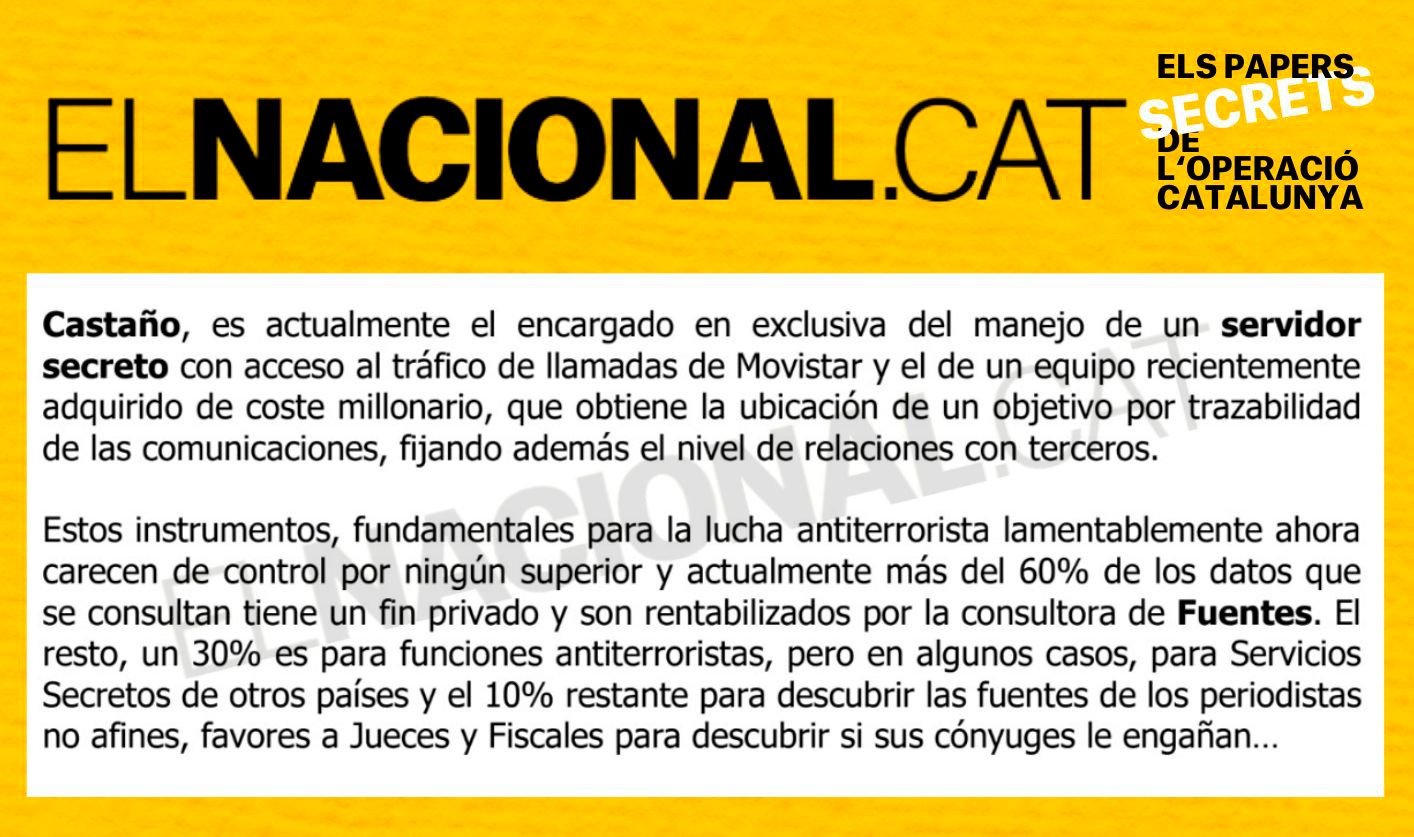In the years of Operation Catalonia, from at least 2014 on, Spain's interior ministry knew that the patriotic police were illegally tapping the phones of members of the public. In fact, the ministry provided a "secret server" and equipment "costing millions" to do so, according to the information memos that former police commissioner José Manuel Villarejo sent to the ministry under Jorge Fernández Díaz and to which ElNacional.cat has had access. Not only that, Villarejo complained in one of the memos, dated March 20th, 2015, about the lack of any kind of control over the use of these tools. With a background marked by his internal disputes with members and former members of the police force, the commissioner reports that 60% of the information that was obtained was used for private purposes. Two years later, the former commissioner Marcelino Martín-Blas, in confrontation with Villarejo, laid a complaint before Madrid Court No 2 accusing the police leadership in the Fernández Díaz ministry of having acquired Israeli technology to intercept phones without judicial authorization.
In the case of the six-page internal memo that Villarejo wrote in 2015, under the heading "Confidential and Reserved", he claimed that only 30% of the information obtained through this technology was destined for what he describes as "anti-terrorist functions", that in some cases the material was for the secret services of other countries, while the remaining 10% was used "to find out the sources used by journalists who were not allies, for favours to judges and prosecutors to find out if their spouses were cheating on them...".
Equipment costing "millions"
Villarejo named names in his complaint. In the memo, he explained that commissioner Enrique García Castaño had "exclusive responsibility for managing a secret server with access to call traffic by major operator Movistar and for recently acquired equipment costing millions that obtains the location of an objective using traceability of communications, also establishing the level of relations with third parties".

García Castaño, also known as El Gordo, was the head of the Central Unit for Operational Support, responsible for surveillance through telephone monitoring, who was eventually investigated in different cases related to Villarejo. Last May, the judge in the Kitchen case temporarily dismissed the accusation against the commissioner after he suffered a stroke. García Castaño assisted the public prosecutors in implicating the interior minister in that case.
As Villarejo explained in the memo, Castaño was also responsible for the false information on the current account held by the mayor of Barcelona Xavier Trias, for which he had pocketed money that was supposedly for payment to informers. "For this and other information on foreign accounts, he received about 7,000 euros in each bank account, claiming that it was to pay collaborators," he explains in the information memo.
No checks
The second key person mentioned in the ex-commissioner's memo was Gabriel Fuentes, former general information commissioner and, according to Villarejo, a confidant of former PSOE minister Juan Alberto Belloch, who had already been investigated in 2014 as part of a police corruption plot, known as the Interligare case.
According to Villarejo, "these instruments, fundamental for the fight against terrorism, are unfortunately not controlled by superiors and currently more than 60% of the data is consulted for a private ends and are used to generate income for Fuentes's consultancy".
Ministry regularly informed
The ministry was kept aware of what was happening. The information above, like the rest of the memos written by the commissioner, was given to the undersecretary for interior, Francisco Martínez, after having previously been verbally explained to him; and the facts also rose to the level of the minister, Jorge Fernández Díaz, who then sent it to the Spanish prime minister, Mariano Rajoy. In this case, these allegations by Villarejo were part of the six-page text, which he reported on the illegal investigation which they carried out on the-then president of the Community of Madrid, Ignacio González. In the last paragraph of the text, the former commissioner took it upon himself to note the fact that the ministerial leadership was aware of everything.
"The current undersecretary for the interior has been specifically and personally informed of each and every one of these pieces of information, since at the time the DAO [Deputy Operative Directorate, Eugenio Pino] requested this direct relationship with JV [José Manuel Villarejo] to avoid informing Cosidó [Director General of the Police], on whom he depends. Both express full confidence in JV as a servant of the State and are therefore unable to harm any of his institutions in any way", concludes the memo dated March 20th, 2015, in a note with which he seems to attempt to shield himself in case he is arrested.
A complaint and no investigation
Two years after the Villarejo warnings and a month before the commissioner was arrested for the Tandem case, in October 2017, the former Spanish police commissioner for internal affairs, Marcelino Martín Blas (dismissed in April 2015 for obstructing the police war with Villarejo) presented a complaint to the Madrid courts, in which he claimed that the police leadership under the minister Fernández Díaz bought technology to intercept telephone communications without judicial authorization.
ElNacional.cat has asked the Spanish interior ministry about this complaint presented to the Madrid courts as well as about the internal complaints raised by Villarejo himself regarding the use of confidential information. From the ministry, however, they affirm that there is no judicial investigation open nor any internal complaint.
However, in the submission presented to the court in 2017, Martín-Blas detailed that the equipment to intercept phone communications had been acquired from the Israeli company Rayzone Group and held that the person responsible for the purchase was the deputy director of operations (DAO), Eugenio Pino, and his chief of staff, José Fuentes Gago. This commissioner provided emails, and a letter from Pino to the head of the company, based in Tel Aviv, on July 31st, 2014, to which ElNacional.cat has now had access, where he was invited to make a demonstration of the spy system.
These two police leaders used a police administrative worker named Lionel as an intermediary to contact the Israeli company, and it was he who eventually disclosed the information to Martín-Blas. The complaint states that this technology was used to record, on October 2nd and 16th, 2014, the interviews between minister Fernández Díaz and the-then director of the antifraud office, Daniel de Alfonso, in which details were given of prospective investigations open against Catalan politicians from the Convergència and ERC parties. And it was also used to spy on the meeting between members of the police's internal affairs unit and members of the CNI intelligence centre, which was already investigating, in a separate piece, the head of the very same Madrid Court No 2, for the case of little Nicolás. It is for this reason that Martín-Blas sent the complaint to this court. Since then, now seven years ago, nothing has been clarified.
Spyware programmes
The application that, according to the complaint, had allegedly been acquired was called InterApp. This app is described as a tactical intelligence system, developed by intelligence agencies, that allows for stealthy collection of information from the cloud through vulnerabilities in smartphone apps. The text states that InterApp does not require any cooperation from the owner of the phone, only that the mobile's wifi transmitter is open, and it doesn't even need to be surfing the web. Thus, it allowed intimate information to be obtained from any mobile user who was close to the system: email, contact list, internet browsing history, locations, etc.
In his complaint, commissioner Martín-Blas maintained that a meeting he held was recorded by having InterApp installed on his mobile and it thus was used as a room microphone. He also maintains that the journalist who was with him installed the Sprinter system, purchased from the same company, which allows the recording of voice calls, text messages and the location of the person. These devices were used in the Catalonia operation, as in the case of Daniel de Alfonso.
Parallel espionage was carried out by the National Intelligence Centre (CNI) using the Pegasus software, from the (also Israeli) company NSO Group, whose targets were members of the Catalan independence movement, as the CNI has admitted, at least in the case of president Pere Aragonès, from July 2019 to 2020, and 17 other people, with the permission of the Supreme Court. The investigators at Canada's Citizen Lab, however, uncovered espionage against 65 people in pro-independence circles.
🔍 All of ElNacional.cat's investigation into the Operation Catalonia papers

